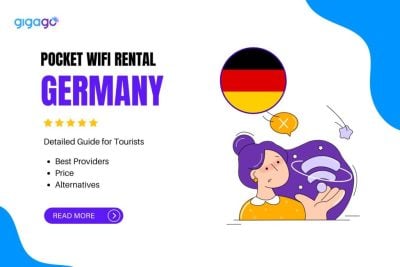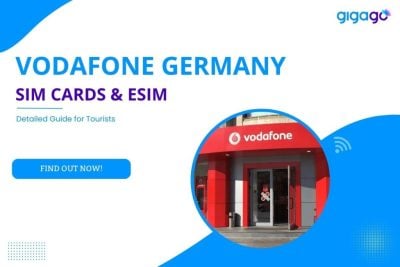Buying a SIM card at Munich Airport is a convenient method to maintain connectivity while visiting. It will be necessary for you to have a dependable Internet connection when visiting Germany.
How To Use Cell Phone In Germany: Traveler’s Guide To Stay Connected
Whether you are a seasoned tourist or this is your first trip to Germany, staying connected is essential. This article provides thorough instructions on how to use cell phone in Germany without any problems. It covers local networks, phone compatibility, determining whether your network is suitable, and other traveler tips.
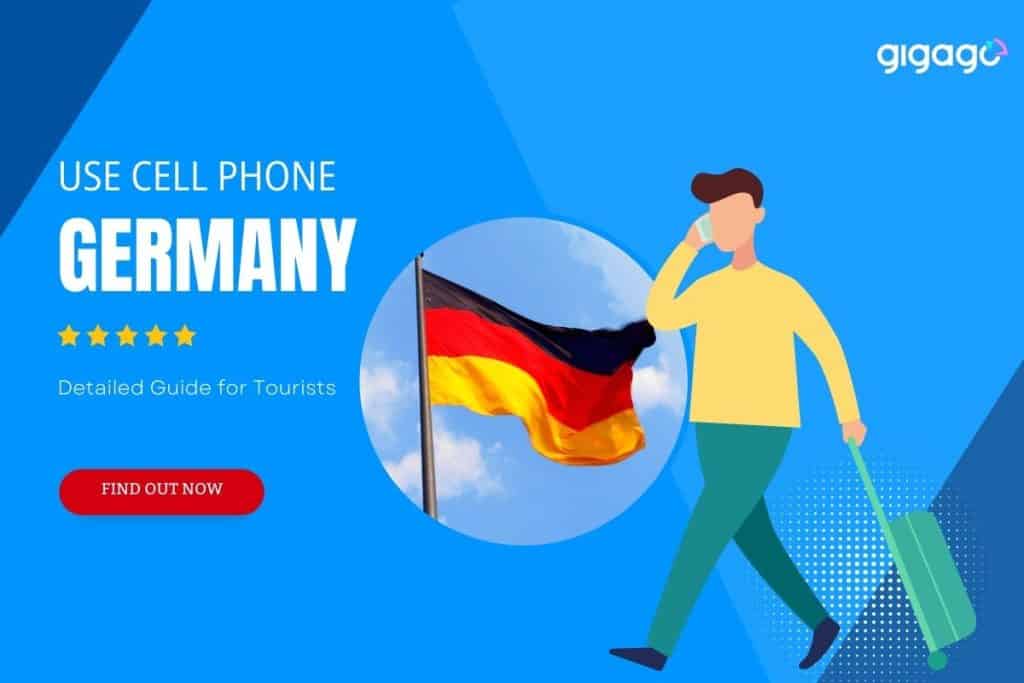
In this article
I. Highlights of Phone Compatibility, Frequencies and Networks in Germany
Here is a summary of phone compatibility, networks, and frequencies in Germany:
1. Phone compatibility
Germany uses GSM networks, unlike some countries that rely on CDMA. This is good news for most modern smartphones as GSM is widely adopted globally.
2. Frequencies Used in Germany
Make sure that your phone is compatible with German frequencies below:
- 2G: GSM bands 900 MHz (B8) and 1800 MHz (B3)
- 3G: UMTS band 2100 MHz (B1)
- 4G: LTE bands 800 MHz (B20), 1800 MHz (B3), and 2100 MHz (B1)
- 5G: n1 (2100 MHz), n78 (3500 MHz), with additional variations depending on the carrier
3. Networks
Major mobile network operators in Germany include: Vodafone, Telekom, O2
- Telekom: The biggest provider offering a variety of services
- Vodafone: Full range of services. Good balance between coverage and affordability make them a popular choice for many users.
- O2: Their network coverage is sufficient for most urban and suburban areas. They often offer competitive rates, making them an attractive option for budget-conscious users
II. Will My Cell Phone Work In Germany?

It depends. Most modern phones (both Android and iPhone) should work in Germany because they use GSM technology, which is the standard in Europe. However, there are exceptions, particularly for older phones in the US that use CDMA technology, which isn’t compatible with European networks. In short, if your phone is relatively new, you should have no problem connecting to the internet during your Germany journey.
Germany uses a variety of frequencies across different generations of cellular networks (2G, 4G, and 5G). To ensure compatibility and use cell phone in Germany, you can check your phone’s specifications to see if it works with German networks. Here’s a breakdown:
| Provider | Bands 5G | Bands 4G | Bands 2G |
| Telekom | n1 (2100), n3 (1800), n77 (3700), n78 (3500) | B1 (2100), B3 (1800), B7 (2600), B8 (900), B20 (800), B28a (700), B32 (1500) | B3 (1800), B8 (900) |
| Vodafone | n1 (2100), n3 (1800), n28a (700), n78 (3500) | B1 (2100), B3 (1800), B7 (2600), B8 (900), B20 (800), B28a (700), B32 (1500), B38 (TDD 2600) | B3 (1800), B8 (900) |
| O2 | n1 (2100), n78 (3500) | B1 (2100), B3 (1800), B7 (2600), B8 (900), B20 (800), B28a (700) | B3 (1800), B8 (900) |
Note: It's always a good idea to check with your carrier to be sure before you arrive in Germany, especially if you are from a country using CDMA technology like the US or Japan.
III. Do I Need An International Plan In Germany?
It depends. International plans are special packages from your existing phone carrier. With an international plan, you might use cell phone in Germany and stay in touch more easily while traveling. Whether you need an international plan in Germany depends on a few factors such as your travel duration and your nationality.
- For EU residents: Thanks to “Roam Like at Home” regulations, you can travel without an additional plan and use your existing EU phone plan in Germany. There won’t be any additional roaming charges to use cell phone in Germany. You’ll be charged the same rates for calls, texts, and data as you would in your home EU country.
- Non-EU travelers: It is necessary to have an international plan in Germany. An international plan allows you to make calls, use data from your home number while abroad. You also don’t have to search for free unsecured public WiFi or use incredibly expensive roaming services. These can be a good option for short trips or if you don’t expect to use your phone much.
Advice for non-EU travelers: Even though free WiFi might seem to reduce travel cost, it still has lots of disadvantages. Free WiFi can be slow and unreliable, especially in crowded areas. Some free WiFi hotspots might have data and time limitations or restrict certain online activities.
IV. What Are Options to Use Cell Phone in Germany For Tourists?
Numerous mobile internet providers in Germany provide plans, such as prepaid physical SIM cards, prepaid eSIMs, and pocket WiFi, to use mobile internet, make calls, or send SMS when traveling in Germany. Here are the features, where to buy, and the pros and cons of each alternative.
1. eSIM Plan for Germany
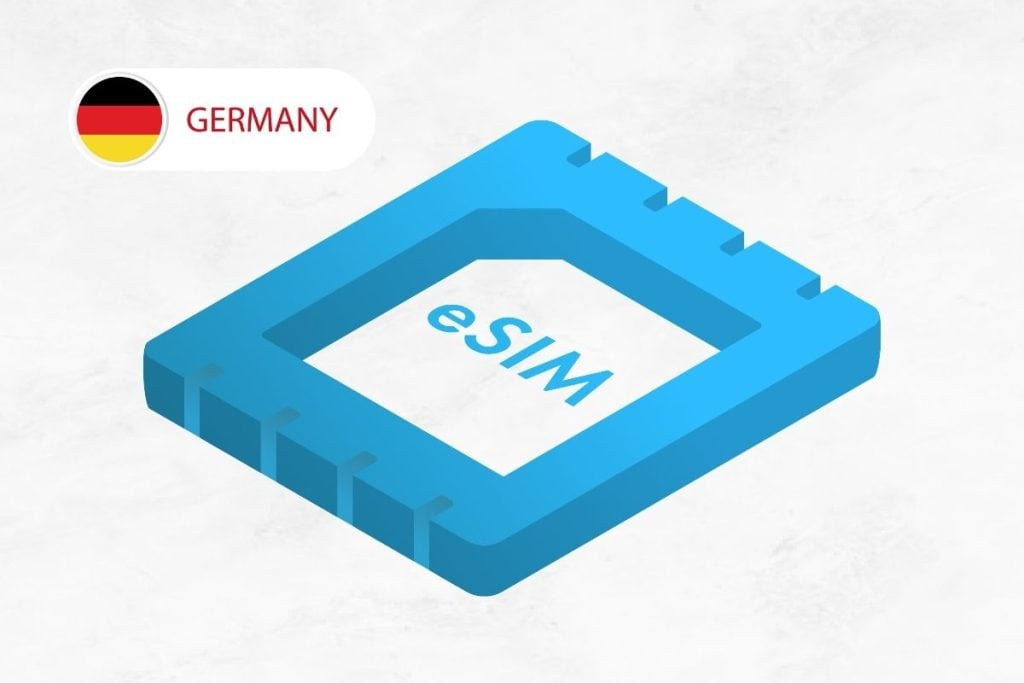
A software-based SIM card that has been downloaded to your phone’s secondary SIM slot is what is known as an eSIM. This keeps your usual SIM card operational while enabling you to utilize mobile data in Germany.
Suitable for: People with smartphones that support eSIM.
Where to buy eSIM for Germany: Download prior to your travel from the websites of reliable providers.
Pros: Virtual, practical, and simple to set up on your phone. No physical SIM required.
Cons: Restricted to eSIM-compatible, more recent devices.
2. International SIM card to use cell phone in Germany
To use cell phone in Germany, the most economical calling and data rates are available using a prepaid physical SIM card for Germany. It’s a tiny chip that you put into your phone. It functions similarly to the one you use at home.
Suitable for: any unlocked cell phone
Where to buy SIM card for Germany: retailers’ stores in the cities, information kiosks at airports when you arrive, and trustworthy websites prior to your journey
Pros: lowest local call and data prices, a variety of plans
Cons: requires an unlocked SIM slot, could be more expensive, cause inconvenience with the physical card, and.
3. Pocket WiFi
Another option for visitors looking for internet access to use cell phone in Germany are pocket WiFi devices. These lightweight devices offer a private, secure hotspot that allows you to connect several devices to the internet at once. The information on using a pocket wifi while traveling is provided below:
Suitable for: Travelers with many devices or in groups that require continuous internet access.
Where to buy Pocket WiFi for Germany: Online or in German airport kiosks
Pros: Connects numerous devices, makes traveling in groups easy, and frequently offers limitless data alternatives.
Cons: High rental costs, lots of things to carry
V. Will My Local Network Work In Germany?
Most likely possible. To use cell phone in Germany, there are no extra fees for accessing your local network as long as you’re an EU resident.
Most modern phones are GSM compatible, which is the network technology used in Germany (unlike CDMA used in some regions). Using your local plan in Germany will likely incur roaming fees, which can be very expensive, especially for data usage.
Special tip: Consider using a German eSIM is the easiest way to avoid roaming charges when you use a cell phone in Germany.
VI. Gigago eSIM – An Alternative To Get Internet In Germany With Your Cell Phone
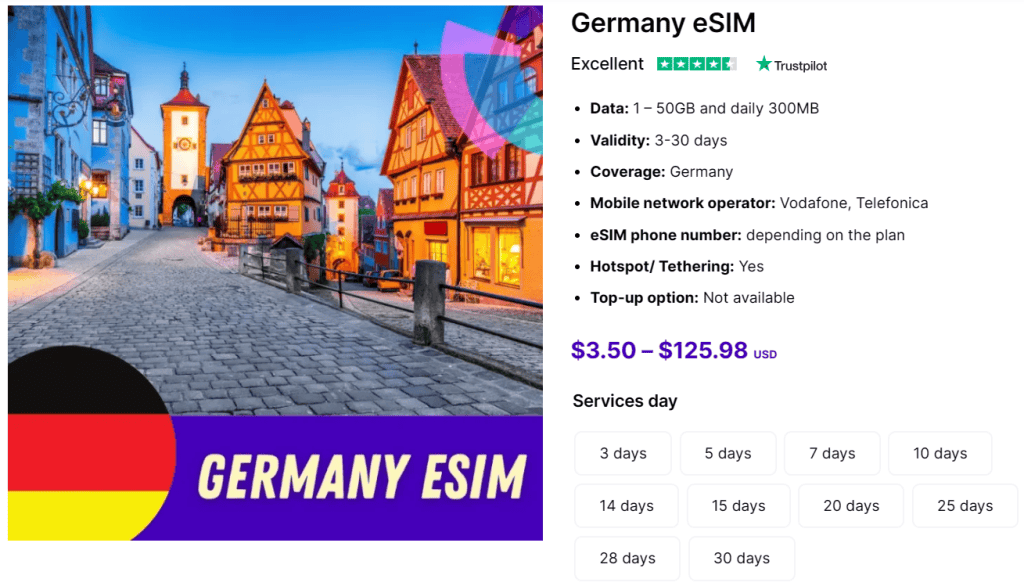
An eSIM is a great choice in Germany because it typically offers much cheaper data, calls, and SMS compared to roaming charges from your home carrier. Additionally, using an eSIM is easy because it avoids the need for switching SIM cards or carrying an extra portable WiFi device.
Gigago sells a variety of affordable eSIM data plans for Germany, beginning at $2.00 for 1 GB of data valid for 3 days. With this wide range from $2.00 – $99.50 , Gigago Germany eSIM is available for all types of travelers in Germany, from those who rarely require internet connection to frequent users.
VII. Extra Tips To Use Cell Phone in Germany
Here are some extra tips for using your cell phone in Germany:
- Download important apps beforehand: Consider downloading essential apps like maps, renting vehicles, and translation tools. This will save you precious mobile data for downloading and ensure you have them ready to use.
- Public WiFi hotspots: If you prefer to use free WiFi hotspots occasionally, be mindful about entering personal information, such as passwords or credit card numbers on unsecured networks.
- Check your data usage: Be alert to your data usage, especially if you have a limited plan. To avoid surprise costs or out-of-data, track your usage using your phone’s settings or carrier app.
VIII. FAQs about Use Cell Phone in Germany
Can I use my cell phone in Germany?
Most modern phones (both Android and iPhone) using GSM technology will work in Germany.
Should I buy Germany SIM card and eSIM?
For convenience and ease of setup, especially for short trips, Germany SIM card and eSIM could be the ideal choices.
Which countries in Europe are free-roaming while visiting Germany?
All 27 European Union countries participate in the Roam Like At Home program including: Austria, Belgium, Bulgaria, Croatia, Cyprus, Czech Republic, Denmark, Estonia, Finland, France, Germany, Greece, Hungary, Ireland, Italy, Latvia, Lithuania, Luxembourg, Malta, the Netherlands, Poland, Portugal, Romania, Slovenia, Slovakia, Spain, Sweden.
IX. Conclusion
Use cell phone in Germany is easy and affordable with lots of options from traditional SIM card, roaming and WiFi hotspots to the newest eSIM technology. Travelers can compare the pros and cons to find the perfect fit for your trip.



